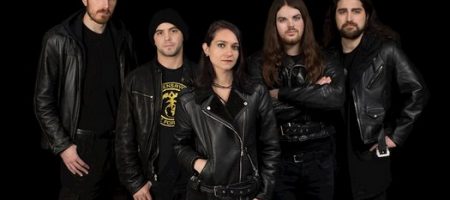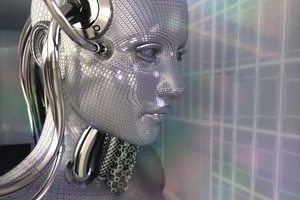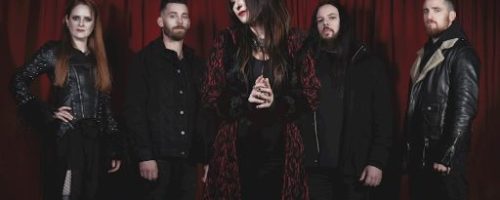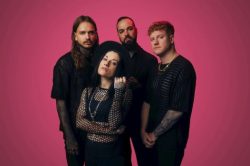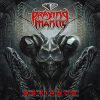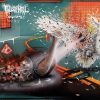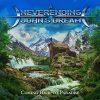Mimesis – (Re)start
Wednesday, 13th November 2019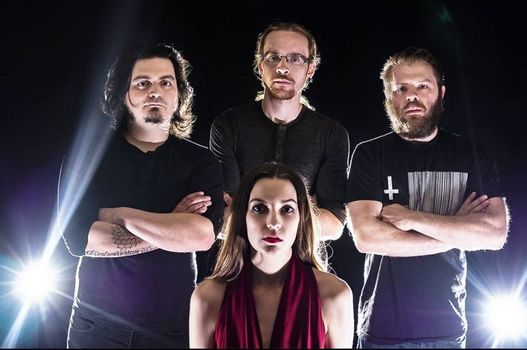
There’s been a steady stream of content and information divulged from New England’s Mimesis since the announcement of their band last year. But we are only now hearing the first completed notes of the band, in the form of the video for “Ctrl Alt Del.” One of the songs taken from their upcoming first release, it’s an intricate track with much to dissect. Whether it’s the progressive riffs, heavy grooves, soaring vocals, or lush atmosphere – the band’s playful video will make it worth the time to absorb it all. To celebrate the release of their video, we sent some questions to vocalist Jen Janet, guitarist Görebläster (Will Lunden), and drummer Tony Lusk-Simone to get all of the details surrounding the track. Not only that, but a preview of what their album will be like, their goals as a band, and even what the band members previous experiences have brought to Mimesis.
Dead Rhetoric: Just to start things off, the band name relates to art imitating life. How does this concept relate to the band?
Jen: I see you’ve done your research! Yes, “Mimesis” means art imitating life. When I was
writing the lyrics for this project, I was going through a lot of changes in my life at the time, and
it was also a time of some uncertainty. I felt like a lot of those emotions directly went into the
music and influenced it a lot. Some of my favorite artists and musicians have written about what
they know, and created works based on their personal experiences. Usually when songs are
written this way, I think more people relate, and therefore feel a connection to the music. That’s
really important to me, and it just so happened that the lyrics I was writing, were coming directly
from my personal experiences. Therefore my lyrics were imitating life.
Dead Rhetoric: What can you say about the process of filming the video for “CTRL ALT DEL” as a whole?
Goreblaster: This song is fairly instrumentally technical, so I felt that it was important that we
integrated instrumental performance shots into this video as well as an interesting and engaging
story element. It speaks a lot to the work ethic and professionalism of everyone in this project
that we were able to pull off all of the shots – performance and story – in the very limited time we
had in the rented studio. The performance shots were challenging – I’d never played some of my
parts standing up for this song – so it took some time to “nail” (close enough for a music video,
anyway) some of the closeup guitar shots.
Jen: Looking at the lyrics, a major theme in this song is technology and computer programming
jargon. It references the idea that I felt like a robot, I felt like I was on autopilot for some time,
and I felt disconnected from people at that time in my life. Goreblaster (guitarist) and I began
storyboarding the video, drawing panels of what each scene should look like, and we went from
there. We wanted to have a virtual world, and some sort of enemy that the main protagonist
would fight. Our drummer Tony, from Zenbeast Media also filmed the video, and edited the
footage. We used a lot of props, so we secured a studio in Massachusetts to shoot at, and brought
a van full of items and gear. We also have Haydee Irizarry from Carnivora performing the harp at
the end of the song. So for her shots at the very end, we went to her place to record the footage.
Tony added a lot of cool special effects in post, and now you can view the finished product.
Tony: I clicked a lot of things, screamed, got blackout and woke up, then the video was done.
Dead Rhetoric: What is the concept that you are aiming to convey with the song? How does the humor add to the overall picture?
Jen: The lyrics revolve around a breakdown in communication, especially in human
relationships. I was in some situations where I felt like there was something wrong with me,
because I just couldn’t connect to certain people in my life on a more meaningful level. It was
like I was on the outside looking in, so to speak. I’m the type of person who can sometimes feel
alone in a crowd, even when surrounded by many people, and it can be quite frustrating.
The lyrics “I think there’s a flaw in my code” and “I think there’s a virus, deep inside us” pertain
to that idea, and use the technology theme as a metaphor.
There’s a humorous, sort of sarcastic section in the middle that sounds like a voicemail, and I added that in to signify the idea of communication not working or getting through. I also just generally find it interesting to think about all the different ways humans used to communicate before technology – actually speaking face to face, writing letters, carrier pigeon, etc. It’s sort of a silly concept isn’t it? The idea that we have all these ways of communicating with people across the world, yet we still feel lonely, or would rather be on our phones than talk to each other face to face.
When editing the footage in post, Tony added a lot of video game humor to the text that appears
at certain parts of the video. For example, when introducing each band member, most of the text
revolves around inside jokes. Kilian is referred to as “Slappy Chungus” which was his name in
our band’s Facebook chat for a while, and Goreblaster is known as “Mad Scientist” because he is
a physicist. When my character in the video is revealed, the name on the screen is “Jent Janet”
as a nod to the djent music genre influences in the song.
Goreblaster: Futuristic visuals were what I had in mind when I first started writing the material
for what would become this project, so I think that we accomplished that quite well with the
video for this song. Even before there were lyrics for this song, it carried an aspect of humor –
the “voicemail” section in the middle of the song is an intentionally incongruous pseudo-jazz
break that is essentially a parody of the abrupt, non-sequitur transitions a lot of “serious” prog
bands seem to incorporate. I like the idea of a band trying to push the limits with its music in
some sense, without taking itself too seriously.
Tony: I feel like a lot of prog bands these days take themselves way too seriously, and forget that
sometimes music *CAN* be fun.
Dead Rhetoric: As the first real taste of the band, what do you hope people walk away from after seeing/hearing the track?
Goreblaster: Mimesis has essentially been an artistic experiment, with the goal of exploring how
no-holds-barred progressive instrumental writing can be melded with equally interesting melodic
vocals. I think this track demonstrates one of the best balances we’ve struck in this regard, and so
I think it serves as the perfect introduction to what it is that we’ve set out to do with our debut.
Additionally, I think this video will demonstrate how it’s been our goal to create visual art that is
on par with the music that we’re releasing. I hope people are genuinely stoked for everything
else to come after seeing this video!
Jen: I think a lot of progressive rock and metal bands are very talented, but lack content when it
comes to interesting visuals and music videos. I really wanted to create an interesting story with
the video Ctrl Alt Del, that didn’t just show musicians playing their instruments. In the future we
are going to release playthrough videos on both guitar and bass for many of our songs, so that
content will still exist but it will be released separately. I hope people will see the Ctrl Alt Del
video and walk away feeling like they saw something a bit unique, and maybe funny, that a lot of
bands in this genre are not doing currently. Ultimately we want to create technical music, but
entertain people who might not have a musical background also. My voice is also not the style
that most progressive or djent inspired bands have, so I hope a lot of audiences will feel like they
are listening to something in the genre that is fresh and unique.
Dead Rhetoric: What can people expect from the album when it releases?
Goreblaster: There are five tracks, and each will have associated content that will be released in
the weeks and months after the album becomes available. We’ve also developed unique
iconography for each song, suggesting the idea that each track is its own free-standing musical
journey, and that the album is a “compendium” of five journeys.
What’s in the tracks? They’re pretty densely packed with stuff. And there are a lot of notes, guitar
wise. The hardest material I’ve ever recorded before, hands down. I think people are going to be
pretty stoked on the material.
Jen: Musically, every song is pretty technical and has a lot going on in the instrumentation. I
think “Ctrl Alt Del” is a song that has something for everyone because it begins very high energy
and progressive rock-esque, but then it does have a cinematic movie-score buildup toward the
end, with piano and choir parts. Overall, each song is going to be like that in some fashion –
definitely a lot of notes, but also a lot of emotional parts in the build ups and transitions. In the
song The Mirror, it begins acapella with some classical singing, which is something a bit unique
for this genre. It is also a much darker sounding song than the others. For audiences not used to
progressive rock, I think the song The Chariot will be a good one to start with. Personally I think
it’s an emotional and relatable track, and it doesn’t move with the same progressive chaos as the
other songs. There will also be a music video coming out for that song eventually, so stay tuned!
Dead Rhetoric: How do you feel that the cover art connects to the album itself?
Jen: The cover art was done by the talented artist Glass Crane, and it depicts a futuristic-looking
robot woman. She is staring at something just out of focus. This goes back to the feeling of being
on the outside looking in, or feeling like you cannot fit in or connect with others. Overall, each
song on the record centers around different human emotions, and begs the question, what does it
mean to be human? The idea of art imitating life (Mimesis) also plays into this album cover – the
subject of the art is something robotic, seemingly devoid of human emotion, and yet is staring
wistfully, looking out at something off in the distance. A robot imitating lifelike humanity is the
perfect image for Mimesis.
Goreblaster: Futuristic visuals were always in my head when we were writing this record. I’m
also usually fueled by ideas of fantasy/escapism when I’m writing. Aside from its relationship to
the lyrical themes of this record, I love how the album cover conveys the idea of a futuristic,
unfamiliar world. That’s definitely where I “was” when writing the instrumentals.
Dead Rhetoric: How have your experiences in other bands been helpful in getting Mimesis off of the ground?
Jen: Before Mimesis, I was in an alternative rock band with progressive and metal influences, so
I had some contacts in the metal community in New England. I played a lot of shows on the east
coast of the US, and had the opportunity to open for acts such as Amorphis, Ne Obliviscaris,
Buckcherry, Puddle of Mudd and many more. It was definitely a good experience, and it made
me want to pursue music further. The reason why I was asked to do vocals for the Mimesis
project was actually because Goreblaster saw my previous band perform in Boston, and he was
looking for a vocalist.
Kilian, our bassist, is also the bassist for Scale the Summit, and he is endorsed with Kiesel
Guitars. He has a lot of experience in the music industry and is also a graduate of Berklee
College of Music. Both he and Tony, our drummer, have toured with the band Abitoic as well,
and Tony currently produces and creates various multimedia projects for other metal bands, such
as The Machinist on Prosthetic Records, and Gozu on Metal Blade Records.
Goreblaster: I’ve had an enjoyable 4-5 years of participating in the New England music scene,
most often through my progressive death metal act The Beast of Nod. I’ve been able to write,
practice, and perform with a variety of talented musicians since I moved here, many of whom
studied at Berklee. So musically I’ve grown immensely over the last few years, thanks to the
environment I’ve been in. The Beast of Nod released an album last year which got WAY more
attention than we expected, partially due to the attention we paid to putting out consistent,
quality video content during the release period. Seeing what worked during that release, and the
unexpected praise I was getting for my guitar work on the record, I was inspired to work toward
an even more successful release for the next record I worked on.
Dead Rhetoric: There’s been a lot of social media updates from the band since its inception. Do you feel it has helped to cultivate a fanbase?
Jen: Definitely, most of us in the band use social media for our personal pages quite often, and
staying in touch with people who like our music is very important to us. I think social media is
the best way currently to get your music out to people who might want to hear it. It’s also a lot of
fun to connect with people all over the world through music, and that’s exactly what we have
been doing. When the full record is released, I hope we’ll be able to make some new fans and
friends.
Goreblaster: I think building hype is really fun. It’s rewarding for everyone to build up a
community, however small, that is excited about something. We’re trying to push ourselves in
new ways with this record – with the quality and quantity of the associated visual content, with
the complexity of the songs and the quality of the performance, and with the presentation of a
cohesive brand to the world. By sharing our process (and now gradually, our product) with the
world through social media, I think we’ve gotten some people pretty excited.
Dead Rhetoric: What does it mean to be progressive in this day and age – and how do you feel that Mimesis fits the billing?
Goreblaster: The simple answer is that “progressive” is probably the best label for rock/metal
music that incorporates odd time signatures, polymeters, linear song structure, chords with fancy
numbers like 9 and 11 attached to their names, etc. In that sense, we are firmly progressive. I like
to think that we are dually progressive, in that we aren’t trying to really emulate or borrow from
any established bands to craft our sound; in the words of a friend, I think we are “suggesting an
alternative” to a lot of the trends in progressive music right now while also incorporating many
of prog’s key elements.
Jen: To me the phrase progressive music also refers to artistic expression that is expanding
stylistic boundaries, and taking elements from other genres and using them in a technical way.
Since Mimesis takes influences from metal, djent music, classical singing and choir music, as
well as utilizing instruments like the piano and harp, I would describe the band as progressive. I
love hearing instruments in rock or metal that one would not always expect to be there. In this
day and age, I think a lot of progressive musicians and bands try to sound somewhat similar to
each other, when that is not necessarily the idea that progressive music began with.
In a modern music industry, I also think it can be difficult to stand out from the crowd when there are so many bands to listen to, so using interesting instruments from other genres is very important to me. I think today, to be progressive means to write and play technical music, but to also add your true personality and style into it, and make it your own to stand out from the crowd.
Dead Rhetoric: What are your goals as a band for Mimesis?
Goreblaster: To me, Mimesis is about unbridled artistic expression. In terms of how the musical
style will evolve, I don’t have a set direction in mind at all. That sentence implies that there is
more music to come, and in fact that is the plan – to write another record. I’ve already been
working on some material for the next record and it’s definitely exploring some new territory.
I’m honestly just curious to see how people receive this music. I suppose you could say that one
of my goals with this project is to get a response out of as many people as possible. The fact that
the music doesn’t really sound a lot like any other bands (as far as I know anyway) probably
means that we should be prepared for some vocal critics, but hopefully also some equally vocal
fans.
Dead Rhetoric: What’s on the horizon for 2020 with the band?
Goreblaster: We have a lot of video content we’ll be rolling out during 2020, so that’s going to
be a lot of fun. I’ve also been starting to rehearse with what will become the live lineup for
Mimesis, which will require at least one additional guitarist. Both Jen and I are moving from
Massachusetts to California in a few months, so we’ll be looking to work on new Mimesis
content and potentially book a run of shows out there as well.
Jen: We plan on performing live on the east coast of the U.S. and perhaps on the west coast as
well. It really depends on demand. If the record is well-received, then it will be a lot easier for us
to travel somewhere or play a festival, etc. If anyone wants Mimesis to perform in their city, let
us know on social media and the more people are interested, the more likely it will happen.











